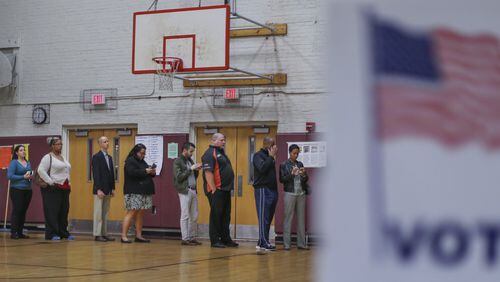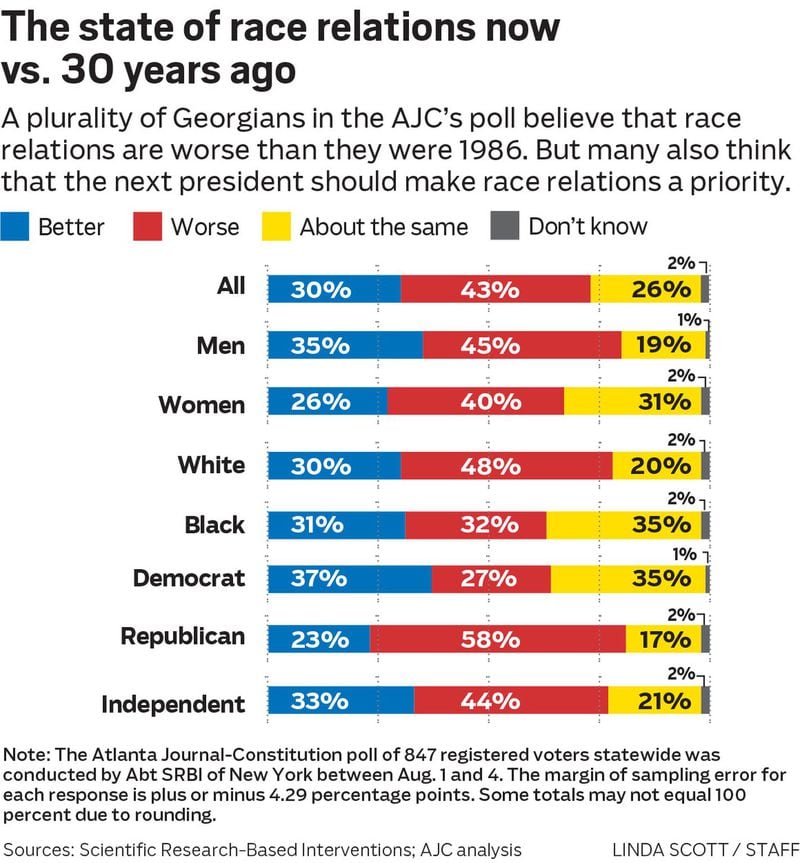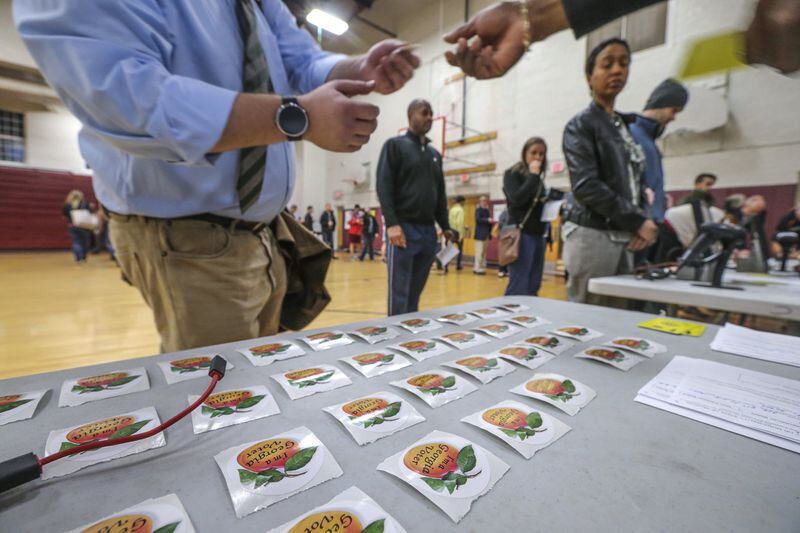About the poll
Abt SRBI surveyed 847 registered voters statewide between Aug. 1 and 4. The margin of error for each response is plus or minus 4.29 percentage points.
The survey used both traditional land-line and cell phones. The data are weighted based on mode (cell only, land-line-only and mixed), region (metro vs. nonmetro), gender, age, race, education and ethnicity (Hispanic vs. non-Hispanic). Some totals may not equal 100 percent due to rounding.
Sources: Scientific Research-Based Interventions; AJC analysis
While race is often a divisive subject, here's one thing most Georgians agree on: across political parties an overwhelming number of the state's voters say they would like to see the next U.S. president put a "major focus" on improving race relations.
How they should be improved and what the outcomes might look like, however, vary widely from party to party and from blacks to whites, according to interviews with some of those surveyed in a recent poll for the Atlanta Journal-Constitution.
The AJC poll also found that Georgians views on how race relations have changed over the past three decades diverged along party and racial lines. Generally speaking, a larger number of whites and Republicans said they believed relations had worsened. A majority of Democrats and black respondents, meanwhile, said they had either improved or stayed about the same since the days when MTV was young, curly perms were the rage and Ronald Reagan was in office.
Conducted between Aug. 1 and Aug. 4, the new poll provides a snapshot of how Georgians view a challenging subject that has been a subtext through out much of the 2016 presidential campaign. It comes as the nation's first black president enters his final months in office.
Even before the campaign season began in earnest, police-involved shootings of African Americans and the subsequent protests and movements they spawned brought renewed emphasis on the state of race in America. The candidacy of Republican nominee Donald Trump has, in its own way, taken the lid off long simmering issues regarding race, ethnicity and the changing demographics of a country rapidly becoming a place where racial minorities are in the majority.
Credit: Linda Scott
Credit: Linda Scott
All of this prompted 78 percent of the Georgia voters surveyed to tell pollsters the next president should make racial issues a priority in his or her administration. When broken out by age, respondents were remarkably consistent in their desire to see movement on the topic. Of 18 to 39 year olds and 40 to 64 year olds, 79 percent wanted the new president to focus on race. Not far behind were those 65 and older, at 76 percent.
One of the pollsters for the AJC's survey said the views in Georgia are on track with national polls.
Seth Brohinsky, of the polling firm Abt SRBI, said with racial tensions in the spotlight a large number of Americans want the issue to be a key focus moving forward.
No longer pushed under the rug
But in interviews with the AJC, some Georgians who took part in the poll laid out vastly different prescriptions on how to tackle the issue, suggesting a rocky road ahead. In fact, there didn’t even seem to be agreement on the destination.
“Obama has done nothing but divide the country and I feel like he did it on purpose,” said Susan Collins, a Republican Trump supporter from Gainesville. “I think (Trump) needs to improve it, but not be sympathetic to criminals just because of the color of their skin.”
The 63-year-old tended to view racial conflict through the prism of crime. She found fault with President Barack Obama contacting families of blacks killed by police such as the girlfriend and family of Philando Castile in St. Paul, Minn. Collins said it showed favoritism, something the Trump supporter said her candidate will not do if he makes it to the Oval Office.
“I feel like (Trump) sees guilt or innocence and he strongly doesn’t care what color they are,” she said.
She took Trump at his word when he said he would be the “law and order” candidate, which Collins said would translate into more training for law enforcement officers, and most importantly, public support for them.
Sixty miles south of Collins in Gainesville, was Kyle Weil, 18, of Buckhead. The Vanderbilt University student supports former Secretary of State and Democratic nominee Hillary Clinton, though he is an Independent.
Race relations in America is an “us versus them mentality,” said Weil. And while it’s not his top election priority it’s pretty high up there. That’s why he’s voting for Clinton. He views her as better than the Republican alternative.
“I don’t necessarily think she’d do the best job with race relations because she seems out of touch,” Weil said. “I don’t see her doing a lot, but I see her doing a lot more for race relations than Donald Trump.”
But when he talks politics with his friends, he hears a much different perspective.
From other young people he either hears that Trump is an omnipotent force who can fix anything, or that there isn’t even a race problem in America to start with, he said.
That a group of Americans see no race problem where another sees a mountain of them, gets to the fundamental divide in the nation that has existed for decades, if not centuries, said some observers. Where one group might see a need to continue affirmative-action based admission policies at public universities, another sees discrimination against white students. Where one group sees aggressive policing against racial minorities, another sees police as acting legitimately to prevent crime.
For some, addressing these issues means supporting and passing laws that provide equality across racial lines. But as far as getting that done today, University of Georgia political science Professor Charles Bullock said it’s different than it was 60 years ago.
“It’s a lot harder to pass legislation that will ensure equal outcomes rather than passing legislation that provides equal opportunity,” he said.
Further clouding each side’s view of the others’, is the fact that social media, cable news outlets and a slew of websites, allow people to hear and contribute to only the arguments they agree with. The mediums are also highlighting problems, often with lighting speed via live-streams and tweets.
“Things are coming to light that were once pushed under the rug,” said Lourann Norris, a 34-year-old Atlanta Democrat who plans to vote for Clinton. “There’s been such a divide but we’re trying to do the best we can.”
She said the next president should implement policies to address better education and employment opportunities, because stagnation on those fronts breeds resentments among those who are left out and “that’s what leads to racism.”
Credit: John Spink
Credit: John Spink
Very different language
Not everyone believes race ought to be at the top of the heap for the incoming commander in chief.
Bill Vaughn, a 48-year-old moderate Republican from Buckhead who said he is voting for Clinton, doesn’t think race relations should be a focus in this election because compared to the economy, terrorism and other issues, it doesn’t stack up.
“Of the things we have facing us, that’s not even in the top five,” Vaughn said. “It’s always been a problem, but now with social media it’s just got more press.”
These are the perspectives the next president will face but how will he or she consider them and perhaps translate them into policy?
“We’re using very different language with a very different data set when we talk about race,” said Carol Anderson, an Emory University professor and author of the bestseller, “White Rage: The Unspoken Truth of Our Racial Divide.” “The power of these very different narratives are shaping the division we see in race relations.”
Anderson argues that the spark for this latest flare-up over race has to do with the nation’s demographic shift toward a less white nation, which for generations has been majority white. Those concerns are inescapable this election, she said, when people who have long held power sense they might be “loosing inordinate power and access to resources.”
U.S. Army veteran Cecil Haywood of Columbus is voting for Clinton, who he thought would be more apt to address race than Trump, a candidate who Haywood said, “doesn’t have a sense of even trying.”
But more than being open about race, Haywood, 60, said what’s going to make a difference is a candidate who’s malleable on the subject. He said too often the dialogue reaches a roadblock when people start to dig their heels in the dirt and are unwilling to work with people.
He said it’s like fishing—if they’re not biting, you can’t keep throwing out the same line.
“You just won’t be fishing,” said Haywood, a Democrat. “You got to try a different lure.”
Whether race relations have gotten better or worse, the groups of Georgians who see them as worse are Republicans and white Protestant evangelicals, according to the poll. Fifty-eight percent of Republicans and white evangelicals, said they felt that way to pollsters.
Those numbers came as no surprise to Robert P. Jones, CEO of the Public Religion Research Institute and author of “The End of White Christian America.” A 2016 survey conducted by PRRI and the Brookings Institute had similar findings. In it, 68 percent of Republicans said the country had changed for the worst since the 1950s. Among white evangelical Protestants the percentage soared to 70. Among Democrats the percentage was 33, and among black Protestants it was 30 percent.
“People aren’t disagreeing about what to do about race relations, they’re disagreeing over whether there even is a problem,” Jones said. “That’s a much harder place to begin any conversation.”
Carol Walk, is a 54-year-old project manager in east Cobb County. She is a Republican but is undecided. Race is among the many issues she wants addressed by whoever takes up residence in the White House. To her, race is a huge problem in this country that has seen little progress. One of the main obstacles for progress is miscommunication, misunderstanding and fear to open a dialogue, she said.
“As a white person I’m terrified of talking about race,” Walk said. “I feel like I’m going to be crucified.”
She said people’s life experiences and how they’re perceived can be so radically different, it’s hard to understand and ask questions without creating more distance.
But as much as pervasive and deserving of attention race relations are, she doesn’t think either Trump or Clinton can do anything to make it better.
“I think a candidate should,” Walk said. “But I don’t think they will. They might do some lip service but as far as doing anything, they won’t.”
About the Author









